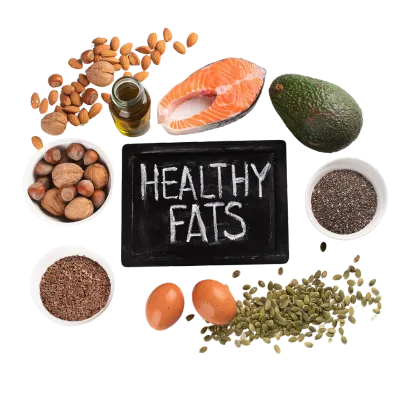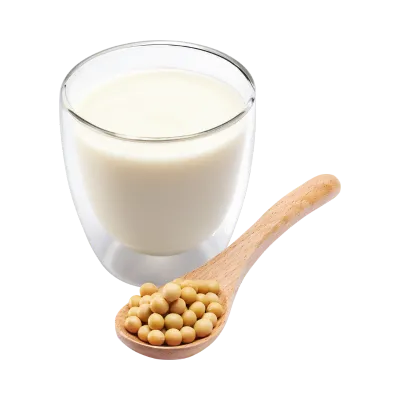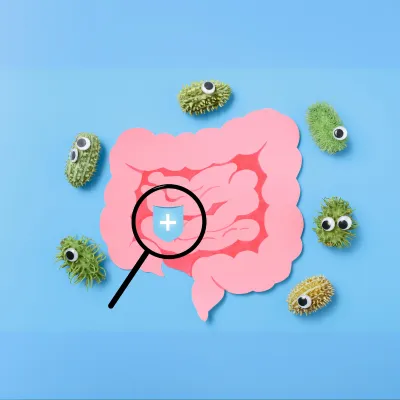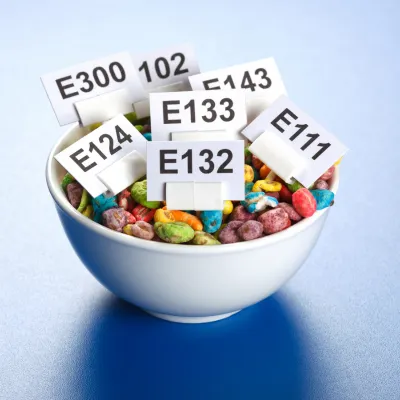Common Food Additive Myths
Food additives often come with misconceptions that can lead to confusion. This section aims to clarify some common myths surrounding food additives.
Myth: All Fat is Bad

Many people believe that all fats are unhealthy. This myth is misleading. While it is true that saturated and trans fats, commonly found in animal-based foods, should be limited, monounsaturated and polyunsaturated fats are beneficial. These healthy fats can be found in sources like vegetable oils, nuts, seeds, avocados, and fatty fish (Scripps Health).
| Type of Fat | Health Impact |
|---|---|
| Saturated Fats | Should be limited |
| Trans Fats | Should be avoided |
| Monounsaturated Fats | Healthy |
| Polyunsaturated Fats | Healthy |
Myth: Fresh vs. Frozen/Canned

Another common myth is that fresh fruits and vegetables are inherently healthier than their frozen or canned counterparts. In reality, frozen or canned fruits and vegetables can match the nutritional value of fresh produce. They often cost less, making them a convenient option. Care should be taken to check for added sugars, saturated fats, and sodium in canned products.
| Fresh | Frozen | Canned |
|---|---|---|
| Potentially high cost | Typically lower cost | Generally lower cost |
| Often more perishable | Longer shelf life | Shelf-stable options |
Myth: Plant-Based Protein Source
A prevalent misconception is that one cannot get enough protein from plant-based foods. This is not true. Plant-based proteins from sources like soy products (e.g., edamame, tofu) and legumes (e.g., beans, chickpeas, lentils) can effectively meet protein needs without the need for meat or dairy.
| Plant-Based Protein Source | Protein Content (per 100g) |
|---|---|
| Edamame | 11g |
| Tofu | 8g |
| Lentils | 9g |
| Chickpeas | 9g |
Myth: Soy-Based Foods

There is also a myth that soy consumption is harmful, particularly regarding breast cancer risk. Current evidence indicates that soy products can have protective effects against breast cancer and can help reduce the risk of heart disease. Thus, soy-based foods can be a healthy addition to the diet.
Myth: Organic Produce Nutritional Value
Many people believe that organic produce is more nutritious than non-organic options. While organic produce may have potential health benefits, studies show no definitive evidence that organic is superior in nutrition compared to conventionally farmed produce. Both types offer similar nutrition and health benefits.
| Produce Type | Nutritional Value |
|---|---|
| Organic | Comparable to conventionally grown |
| Conventionally Grown | Comparable to organic |
Understanding these myths can help consumers make informed choices when it comes to food additives and overall nutrition. For more on the topic, consider reading about controversial food additives or exploring natural additives.
Understanding Food Additives
Grasping the roles and regulations surrounding food additives can help consumers make informed choices. This section explores the evaluation process for food additives, the regulation and safety oversight in place, and how consumer perceptions affect acceptance.
Food Additive Evaluation Process
The evaluation of food additives involves a comprehensive analysis before approval for public consumption. Various organizations, including the World Health Organization (WHO) and the Codex Alimentarius Commission, evaluate the safety and efficacy of these substances. This evaluation process assesses several factors including:
- Chemical composition
- Intended use in food products
- Potential health effects and toxicity levels
Only after thorough investigation and consistent results indicating safety are additives approved for use. Detailed studies help dispel many common food additive myths.
Regulation and Safety Oversight
Regulatory bodies such as the Food and Drug Administration (FDA) in the United States play a crucial role in overseeing food additives. They ensure that these substances meet strict safety standards before being incorporated into food products. The key components of regulation include:
- Safety Data Requirements: Manufacturers must submit evidence demonstrating the safety of an additive, including toxicological studies and potential effects on human health.
- GRAS Designation: Some additives may be deemed Generally Recognized As Safe (GRAS) based on a history of safe use or scientific evidence.
Knowing how additives are regulated can help consumers feel more secure about what they are consuming. You can learn more about GRAS in the FDA and GRAS Program.
Consumer Perception and Acceptance
Consumer perception significantly influences the acceptance of food additives. Many individuals are concerned about the long-term health impacts of consuming processed foods with these substances. Comfort with food additives often hinges on several factors:
- Education on Additives: Misinformation can lead to skepticism. Understanding what each additive does and its purpose in food can alleviate fears.
- Natural vs. Synthetic: There is a growing preference for natural additives over synthetic ones. Consumers often seek products with fewer artificial ingredients, leading to increased demand for natural additives.
Tables summarizing consumer preferences and trends can further clarify how opinions vary regarding the use of additives in foods.
| Factor Influencing Perception | Description |
|---|---|
| Source of Additive | Preference for natural ingredients over synthetic |
| Knowledge and Transparency | Better understanding leads to greater acceptance |
| Media Influence | Coverage on health risks associated with certain additives |
Educating oneself about the role and safety of food additives can diminish anxiety over processed foods. For more on how to interpret product information, see our guide on reading food labels. Understanding the basics of food additives can help individuals navigate the often complex world of ingredient lists.
Health Impacts of Food Additives
Food additives play a significant role in the processed foods that many individuals consume. While these substances help enhance the quality, taste, and longevity of food, their health impacts can be a concern for those who are curious or cautious about what they eat. This section will address synthetic chemical additives, their potential health risks, and their impact on gut health.
Synthetic Chemical Additives
Synthetic food additives encompass a wide range of substances used to improve the characteristics of food products. Over 2,500 permitted additives are included in food items to enhance appearance, smell, texture, taste, and shelf-life. However, these additives can also come with various health risks.
Some common synthetic additives include sodium benzoate, aspartame, and tartrazine. Research indicates that synthetic chemicals may lead to harmful health effects such as asthma, attention deficit hyperactivity disorder (ADHD), heart problems, and even an increased risk of certain cancers (PubMed Central). Continuous consumption of products with these additives can accumulate in the body, potentially affecting overall well-being.
| Additive | Potential Health Concerns |
|---|---|
| Sodium Benzoate | Cellular damage, teratogenicity, allergens |
| Aspartame | Neurological disorders, various health issues |
| Tartrazine | Allergic reactions, hyperactivity in children |
Potential Health Risks
The association of food additives with various health risks is an area of active research. For instance, sodium benzoate, commonly used as a preservative, has been linked to case reports of cellular damage and may pose risks for teratogenicity, leading to potential defects like craniofacial deformities. These risks highlight the importance of understanding what is being consumed.
Moreover, studies have suggested that very low concentrations of certain emulsifiers, such as Polysorbate 80, may result in bacterial translocation across the intestinal epithelium along with intestinal inflammation. This could contribute to serious conditions such as coronary artery disease, type 2 diabetes, and Crohn’s disease. Such findings raise concerns about the long-term consumption of foods with synthetic additives.
Impact on Gut Health

The health of the gut microbiota is increasingly recognized as an important aspect of overall health. The influence of food additives on gut health can be significant, with some synthetic additives shown to disrupt the balance of gut bacteria. This imbalance may lead to gastrointestinal issues and affect nutrient absorption.
Research projects are underway to assess the impact of food emulsifiers on the gut’s mucosal barrier, which is essential for the prevention of inflammation and the maintenance of gut health. These studies involve various methodologies, including cell-line research and controlled human volunteer studies, to better understand how certain additives may affect gut function and overall health.
Individuals concerned about food additives should consider educating themselves on natural additives and how to read food labels to make informed choices about the products they purchase. Understanding the potential effects of food additives is key to healthier eating habits.
Additive Usage and Prevalence
Understanding the usage and prevalence of food additives is crucial for consumers who are curious or concerned about what is in processed foods. This section explores the role of additives in food, consumption estimates, and the different types of food additives.
Role in Processed Foods
Food additives serve a variety of roles in processed foods. They enhance appearance, smell, texture, taste, and shelf-life. Over 2,500 permitted food additives are included in the food supply, making them a vital ingredient in many products. Additives contribute significantly to the overall quality and safety of food, making it more appealing and enjoyable for consumers. These substances help maintain freshness and prevent spoilage, enabling longer storage periods. For more information on the pros and cons of specific additives, check our article on controversial food additives.
Consumption Estimates
The consumption of additive-containing processed foods is noteworthy. In industrial countries, these foods can account for between 25% and 50% of total daily energy intake, with each person estimated to consume around 7-8 kg of food additives per year. The prevalent use of additives in the processed food industry raises questions about their health implications, making it important for consumers to read food labels carefully.
| Consumption Estimates | Amount |
|---|---|
| Total annual intake per person | 7-8 kg |
| Percentage of daily energy from processed foods | 25-50% |
Types of Food Additives

Food additives can be categorized into several types based on their functions. The major categories include:
- Preservatives: Used to prolong shelf-life and prevent spoilage. For more, check our article on preservative role.
- Flavor Enhancers: Improve or enhance the taste of food products.
- Colors and Dyes: Add visual appeal to food items. For natural alternatives, refer to our piece on natural additives.
- Thickeners and Stabilizers: Improve texture and consistency.
- Artificial Sweeteners: Provide sweetness without added calories.
Each type of additive has its own set of safety and regulatory guidelines regulated by food safety authorities. Consumers are increasingly interested in the evolution of food additives and the implications of using both artificial and organic additives, as showcased in our article on organic additives. The complexity of food regulations and the prevalence of additives underscore the importance of ongoing consumer education and awareness.
Specific Additives and Health Effects
Sodium Benzoate
Sodium benzoate is a widely used synthetic food preservative that helps to extend the shelf life of various products. However, there are significant health concerns associated with its long-term use. Studies have indicated that sodium benzoate may lead to cellular damage, teratogenicity, and other allergic reactions. Specifically, exposure can result in defects such as craniofacial deformities and neural tube defects (PubMed Central).
To better understand its effects, here is a summary of health impacts related to sodium benzoate:
| Health Effect | Description |
|---|---|
| Cellular Damage | Damage to the cells potentially leading to various health issues |
| Teratogenic Effects | Can induce deformities in developing embryos |
| Allergic Reactions | Sensitivity and potential allergic responses in some individuals |
You Might Also Like:
Potassium Benzoate
Potassium benzoate is another synthetic preservative similar to sodium benzoate. Research has shown that this additive can inhibit intracellular protein and DNA synthesis, resulting in adverse effects during embryonic development. In experiments with pregnant mice, potassium benzoate exposure caused severe abnormalities in the embryonic eyes, including bleeding, lens malformation, and retinal folds with underdeveloped layers.
The impacts of potassium benzoate can be categorized as follows:
| Health Effect | Description |
|---|---|
| Protein and DNA Synthesis Suppression | Can hinder the normal growth and development of cells |
| Eye Abnormalities | Causes severe malformations in embryonic eye structures |
Understanding the implications of various food additives like potassium benzoate is essential for consumers concerned about ingredient safety.
Aspartame
Aspartame is an artificial sweetener that has drawn significant attention due to its controversial status. Research indicates that aspartame may have teratogenic effects, particularly on chick embryos. High concentrations have been associated with growth retardation, tail deformities, and adverse physiological changes in developing organisms (PubMed Central).
The potential health concerns linked to aspartame can be summarized as follows:
| Health Effect | Description |
|---|---|
| Teratogenic Effects | Can lead to developmental deformities in embryos |
| Organ Toxicity | Metabolites may be harmful to various organs |
Aspartame’s safety continues to be debated, making it important for consumers to be aware of the products they are consuming.
Keeping informed about the specific additives present in processed foods can empower individuals to make healthier choices in their diets.
FDA and GRAS Program
Understanding the role of the FDA’s Generally Recognized As Safe (GRAS) program is essential for consumers who are curious or concerned about food additives. This program significantly impacts the safety assessments of ingredients used in processed foods.
Generally Recognized As Safe (GRAS)
The GRAS Notification Program, overseen by the United States Food and Drug Administration, allows food manufacturers to market ingredients deemed safe based on existing scientific consensus and publicly available data. This process is transparent and involves expert evaluation by scientists. Importantly, food makers can bring these safe ingredients to market without the need for new proprietary data (Perfect Day).
In essence, GRAS status is granted to ingredients that have a long history of safe use or have been widely accepted by experts in the field. Although the federal law established in 1958 defines food additives and mandates premarket approval for most substances, the GRAS exemption allows for certain ingredients to bypass this requirement.
Safety Data Requirements
For an ingredient to achieve GRAS status, it must meet specific safety data requirements. This includes a thorough evaluation of scientific literature, studies demonstrating no adverse health effects, and sufficient historical usage data. While companies can self-affirm GRAS status without notifying the FDA, many opt for FDA evaluation to ensure both safety and public transparency. This is crucial in fostering consumer trust in food products (Perfect Day).
In the case of new scientific evidence emerging that questions the safety of a previously recognized ingredient, such as partially hydrogenated oils, the FDA has the authority to revoke its GRAS status. This regulatory flexibility reflects the agency’s commitment to maintaining public safety regarding food additives (Perfect Day).
Transparency and Consumer Safety
Transparency is a key aspect of the GRAS program. Consumers have the right to know what is in their food, and the FDA works toward ensuring this transparency. Companies committed to consumer safety will take the extra steps to pursue GRAS determination through the FDA rather than solely relying on self-affirmed status. This ensures public evaluation of their safety data, effectively building trust with consumers (Perfect Day).
Understanding the GRAS program helps demystify the role of food additives and reassures consumers about the safety of the products they purchase.
You Might Also Like:
What are food additives, and why are they used?
Food additives are substances added to food to enhance its flavor, texture, appearance, or shelf life. They are used in a wide range of processed foods to improve quality and ensure safety by preventing spoilage and extending shelf life.
Are all food additives harmful?
No, not all food additives are harmful. Many additives, especially those derived from natural sources, are safe and essential for maintaining food quality. However, some synthetic additives have raised concerns due to potential health risks, so it’s important to be informed about which additives are in your food.
Is it true that all fats are bad for you?
This is a myth. Not all fats are bad. While saturated and trans fats should be limited, monounsaturated and polyunsaturated fats, found in foods like nuts, seeds, and avocados, are healthy and beneficial to your diet.
Are fresh fruits and vegetables always healthier than frozen or canned ones?
Not necessarily. Frozen and canned fruits and vegetables can be just as nutritious as fresh ones. However, it’s important to check canned products for added sugars, fats, and sodium.
Can you get enough protein from plant-based foods?
Yes, plant-based foods can provide ample protein. Sources like lentils, chickpeas, tofu, and edamame are rich in protein and can meet your dietary needs without the need for meat or dairy.
Is soy harmful to your health?
Contrary to some myths, soy products are not harmful and may even offer protective effects against breast cancer and heart disease. Soy can be a healthy part of your diet.
Is organic produce more nutritious than conventionally grown produce?
Studies show that organic and conventionally grown produce offer similar nutritional value. While organic produce may have other benefits, such as lower pesticide residues, it is not necessarily more nutritious.
What is the GRAS program?
The GRAS (Generally Recognized As Safe) program allows certain food additives to be used without pre-market approval if they are deemed safe based on a history of common use or scientific evidence. This program helps ensure the safety of many ingredients in our food.
How do synthetic additives affect health?
Some synthetic additives have been linked to health concerns such as allergic reactions, digestive issues, and potential long-term effects like cancer risk. It’s important to be aware of the specific additives in your food and their potential impacts.

